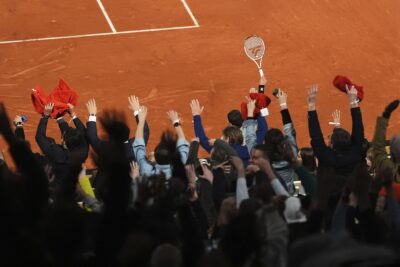Opponents of French players at the French Open deal with insults and whistling and, yes, even gum
By Canadian Press on May 28, 2025.

PARIS (AP) — In all sports, there are advantages to being at home. At the French Open tennis tournament, being a visitor playing against a French player can feel as though the whole world is against you.
The crowds don’t just cheer. They boo, they whistle, they make noise between serves, they hurl insults — and, at least once, even gum — at the locals’ opponents. That sort of behavior is why the tournament organizers banned alcohol from the stands last year, a policy still in place.
Some of the non-French athletes who deal with that sort of negativity in Paris, such as 19-year-old Jakub Mensík of the Czech Republic, who eliminated Alexandre Müller in front of a rowdy crowd at Court 14 on Tuesday, compare the high-intensity atmosphere to that of a soccer game.
Others choose stronger terms.
One player says French Open fans can be ‘disgusting’
“Disgusting. Worst experience of my life,” was what Nicolás Jarry of Chile said this week when asked to think back to last year’s rowdy loss at Court Simonne-Mathieu to France’s Corentin Moutet, whose coach had implored the spectators to make life “hell” for Jarry after the two had a contentious meeting in Santiago earlier in the season.
Jarry blamed that on Moutet, saying that everything was calmer during his loss Monday to another Frenchman, Arthur Fils, whom the Chilean called a “good guy” and a “gentleman.”
“It’s a battle out there, you know. Sometimes, it’s not just a battle with the player,” said Novak Djokovic, who is scheduled to face the irrepressible Moutet in the second round Thursday.
Expect an antagonistic atmosphere. Djokovic sure does.
Roland-Garros spectators can be ‘louder and more passionate’
“They’re going to have the crowd on their side. It’s nothing strange about it. It’s expected,” the 24-time Grand Slam champion said. “But it is true that here in France and in Paris, comparing to other Slams, the people are louder and more passionate and just give more support, louder support, more energy to their player, which for some (opponents) can be annoying. It’s not the kind of ideal environment you want to be playing in, but you have to be ready for it.”
So much for the supposed silence usually found in a tennis arena. It all raises questions about where the line between support and incivility lies.
“We’ve stepped up security,” tournament director Amélie Mauresmo, a former No. 1 player, said before this year’s event, “and given chair umpires greater power to intervene and report unacceptable behavior in the stands.”
For Mensík on Tuesday, the jeers began every time he hit the ball during the warmup ahead of his 7-5, 6-7 (5), 7-5, 6-3 win over France’s Müller. More arrived once play began, accompanying each of his 20 aces or just when he simply walked to check a ball mark — a routine part of clay-court tennis.
After taking the third set, Mensík gave the boo birds a little bit back, waving his right index finger as if it were a baton conducting an orchestra, a move he learned from Djokovic.
“Sometimes,” Mensík said of the crowd, “it is too far.”
Still, there are those who shrug it all off.
Some players say the rowdy crowds in Paris are just part of tennis
“That’s part of tennis, especially here. My opponent had her fans here; I have mine in Belgium. It’s normal,” said Elise Mertens, the 24th-seeded Belgian who was a semifinalist at the 2018 Australian Open and lost Tuesday to Lois Boisson of France at Court 14. “Fans were loud but not insulting. I didn’t feel any particular hostility.”
There are two sides to the loud backing French players receive.
It “makes you feel like you could reach for the stars,” said the highest-ranked French woman, Varvara Gracheva, who acknowledged that support also can become a burden.
She lost in the first round Tuesday.
25 years since a Frenchwoman won the French Open, 42 since a man did
It’s been a quarter of a century since a woman representing the host nation won the singles title at the French Open ( Mary Pierce in 2000) and even longer since a man did ( Yannick Noah in 1983).
“As French players, we’re under pressure all the time when we play here” said Moutet, currently ranked No. 73. “When you lose, you ‘suck.’ When you win, you’re ‘King of the World.’ So you have to try to ignore the pressure.”
Nathan Fhima, an 18-year-old high school student from Paris, figured his compatriots needed his voice. So there he was this week at Roland-Garros, waving a blue-white-and-red French flag and screaming himself hoarse while skipping class to watch qualifying and first-round matches.
“We have to push them, because not much will happen otherwise,” he said after watching France’s Diane Parry lose Monday. “Maybe that noise will lift a homegrown champion to victory again. We have to believe.”
___
AP tennis: https://apnews.com/hub/tennis
Tom Nouvian And Howard Fendrich, The Associated Press
-32




